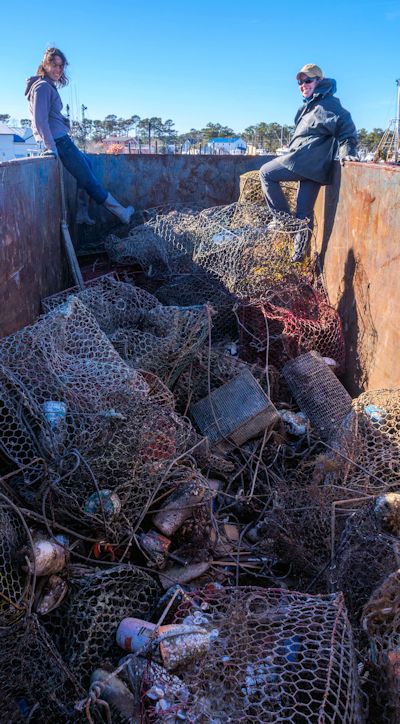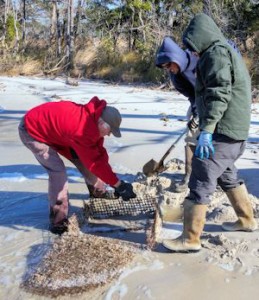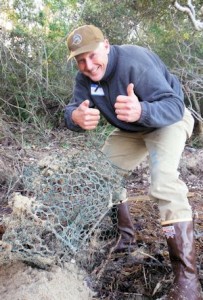Marine Life & Conservation
Crab Pot Project Gets a Thumbs Up

As a busy-body pelican landed nearby to watch, Manteo crabber Troy Outland pulled his 32-foot Manning boat astride a barnacle-covered chunk of white buoy while mate Derek Thacker pulled it from Croatan Sound.
“That one’s been there for a while,” Outland said, eyeing the dripping remnant of a crab pot.
The line was slimy with algae and grass and attached to the rusted remains of the pot’s metal bottom frame. Bingo: A derelict pot. Thacker wound up the line and stashed it at the stern. Outland recorded identifying information, time and location and started his motor to look for more.
So began day one of the N.C. Coastal Federation’s two-year pilot project to collect lost or discarded fishing gear littering waterways in north eastern North Carolina.
Outland, a full-time crabber for 37 years, was one of nine watermen hired to scour the waters for two days last week, coming behind the annual cleanup done by the N.C. Marine Patrol.
“You don’t really make a lot of money, after fuel costs,” he said. “I’m doing it because I think it’s a good project.”
By the time the first phase wrapped up at week’s end, surprisingly little debris was found by the watermen. Still, the effort, the first of its kind in North Carolina, achieved what it was designed to do: Bring watermen, regulators, and conservationists together for the benefit of the resource they all share.
“Overall, we were astounded that we didn’t see more pots,” said Willy Phillips, owner of Full Circle Crab Co. in Columbia. “That was a real revelation to us.”
Phillips, who has been crabbing in North Carolina waters since the 1980s, said that the lack of big storms in recent years is one likely reason that more crab pots were not found after two days scouring parts of the Pamlico, Roanoke, Croatan, Albemarle and Currituck sounds, the Alligator River and Kitty Hawk Bay.
Also, with the increasing cost of crab pots, he said, crabbers have become more diligent about retrieving their gear. When he was crabbing in the 1980s, Phillips said, pots cost about $6.50 each. Now they each cost about $45. And pots are not made to last as long as they once did, so they deteriorate quicker – as soon as two years.
“Back in the day, there was a lot more gear left out,” Phillips said. “It was just that there weren’t as many people out there to keep track of it.”
Willy Phillips
Ladd Bayliss
As long as there are pots put in the water, one way or another, some will end up disappearing, being abandoned, tossed adrift by hurricanes or even stolen.
Plucking lost or orphaned crab pots out of the water is a lot more challenging than it sounds. The remnants of buoys can be indistinguishable from a bird or a whitecap on the water. Gear is often buried or tangled. Phillips explained that in bad weather, the buoys start “corkscrewing” and are eventually pulled under the water. Then over time, he said, the buoys will slowly “unkink” themselves.
Other pots, perhaps taken away by a storm or cut by boat propellers, are often found with their lines twisted around bridge pilings.
“When I started here nine years ago, we picked up roughly 10,000 pots that were out in the sound between Jan. 15 and Jan. 24,” said Sgt. Odell Williams, who works the southern half of the northern district of the N.C. Marine Patrol – half of Hyde and Dare counties. “Every year it has gone down – the last several years significantly.”
This year, he said, the patrol probably picked up less than 300 pots.
By law, crab pots must be out of the water from Jan. 15 through Feb. 7, but the water can be opened after Jan. 19 if few pots are found.
Williams said he attributes the steady decrease in orphaned and derelict gear to better Marine Patrol enforcement and more cooperation from watermen. When officers find a pot, they look for the tag that identifies the owner. If they find it, they will usually call the crabber to come fetch his pots. Otherwise, a court order must be obtained to have them destroyed.
Less often, Williams said, a ticket is issued to the crabber, who would be facing over $200 in fines and court costs. “Storms come in; fishermen lose their pots,” he said. “We try to be respectful to the fishermen. Everybody does not deserve a ticket.”
Williams said that throughout the planning and implementation of the project, the relationship between marine law enforcement, the watermen and the federation has been “excellent.”
“We’ve really enjoyed working with them,” Williams said. “We’ve gotten along great.”
The genesis for the project came from the successful marine debris program launched several years ago in the Chesapeake Bay. By 2012, tens of thousands of derelict crab and peeler pots in Virginia and Maryland waters had been collected.
Although the Chesapeake program was the inspiration for the federation project, it was expected that it would need to be tailored to the different conditions in northeastern N.C. waters, said Ladd Bayliss, the coastal advocate in the federation’s Manteo office.
“I think in certain areas, we’ve got more tide, we’ve got more wind, we’re generally shallower,” she said. “It’s not apples to apples.”
Some boats were equipped with side-scan sonar, the first time the technology was put to work in North Carolina to find pots. Over the course of the project, Bayliss said, it became evident that the same protocol and retrieval methods employed in the Chesapeake were not appropriate in N.C. waters.
Out of the 30 or so crabbers who applied to work on the cleanup, Bayliss said, nine of them were hired to do the collection. Boat captains were paid $300 a day and deck hands $100.
The second year of the pilot project, funded with a $35,000 grant from the National Oceanic and Atmospheric Administration, an $18,000 grant from North Carolina Sea Grant and $10,000 in matching funds, will be conducted in the same time period next year.
In the meantime, the lessons learned from this year will be used to make the collection process more effective and efficient in 2015.
“I feel like this time we were able to get a collaborative group of people together to get the mechanics worked out,” Phillips said. “We were on the same page.”
A marine debris program has been talked about in North Carolina for a long time, he said. But until last year, opposition and suspicion never allowed such a project to get beyond fits and starts.
“What I think is the star achievement of the grant is that the fishermen are actively collecting data,” Phillips said, referring mostly to by-catch found in crab cages.
Fishermen have been gun-shy about providing that data because of the perception that in the past they’ve been burned by increased regulations.
Phillips, a former member of the N.C. Marine Fisheries Commission, said that N.C. watermen have always contended that by-catch is not significant down here compared with Virginia. But without the data, there’s no way to prove it.
A less obvious gain from the project is the positive experience of working cooperatively in a conservation effort that benefits all involved and serves the better good, Phillips said. It also shows that fishermen don’t just take from the public resource, as critics charge, but are willing to give back, he said.
“It’s an image-changer in the public’s eye,” Phillips said. “I really hope it will continue and expand.”
Article courtesy of www.nccoast.org
For more information on Ghost Fishing, visit https://www.facebook.com/ghostfishing
Marine Life & Conservation
Double Bubble for Basking Sharks

 The Shark Trust is excited to announce that, for two more days only, all donations, large or small, will be doubled in the Big Give Green Match Fund!
The Shark Trust is excited to announce that, for two more days only, all donations, large or small, will be doubled in the Big Give Green Match Fund!
Donate to Basking in Nature: Sighting Giants
The Shark Trust is hoping to raise £10k which will be doubled to £20k. This will go towards Basking in Nature: Sighting Giants. And they need YOUR help to reach they’re goal.
The Shark Trust’s citizen science project is to monitor and assess basking sharks through sightings; encouraging data collection, community engagement, and promoting nature accessibility. This initiative aims to enhance health and wellbeing by fostering a deeper connection with British Sharks.
Campaign Aims
- Increase citizen science reporting of Basking Sharks and other shark sightings to help inform shark and ray conservation.
- Provide educational talks about the diverse range of sharks and rays in British waters and accessible identification guides!
- Create engaging and fun information panels on how to ID the amazing sharks and rays we have on our doorstep! These can be used on coastal paths around the Southwest. With activities and information on how you can make a difference for sharks and rays!
- Promote mental wellbeing through increasing time in nature and discovering the wonders beneath the waves!
Donate, and double your impact. Click Here
Marine Life & Conservation
Leading UK-based shark conservation charity, the Shark Trust, is delighted to announce tour operator Diverse Travel as a Corporate Patron

 Corporate Patrons provide a valuable boost to the work of The Shark Trust. The Trust team works globally to safeguard the future of sharks, and their close cousins, the skates and rays, engaging with a global network of scientists, policymakers, conservation professionals, businesses and supporters to further shark conservation.
Corporate Patrons provide a valuable boost to the work of The Shark Trust. The Trust team works globally to safeguard the future of sharks, and their close cousins, the skates and rays, engaging with a global network of scientists, policymakers, conservation professionals, businesses and supporters to further shark conservation.
Specialist tour operator Diverse Travel has operated since 2014 and is committed to offering its guests high quality, sustainable scuba diving holidays worldwide. Working together with the Shark Trust will enable both organisations to widen engagement and encourage divers and snorkellers to actively get involved in shark conservation.
“Sharks are truly at the heart of every diver and at Diverse Travel, we absolutely share that passion. There is nothing like seeing a shark in the wild – it’s a moment that stays with you forever!” says Holly Bredin, Sales & Marketing Manager, Diverse Travel.
“We’re delighted to celebrate our 10th year of business by becoming a Corporate Patron of the Shark Trust. This is an exciting partnership for Diverse and our guests. We will be donating on behalf of every person who books a holiday with us to contribute towards their vital shark conservation initiatives around the world. We will also be working together with the Trust to inspire divers, snorkellers and other travellers to take an active role – at home and abroad – in citizen science projects and other activities.”
Paul Cox, CEO of The Shark Trust, said:
“It’s an exciting partnership and we’re thrilled to be working with Diverse Travel to enable more divers and travellers to get involved with sharks and shark conservation. Sharks face considerable conservation challenges but, through collaboration and collective action, we can secure a brighter future for sharks and their ocean home. This new partnership takes us one more valuable step towards that goal.”
For more information about the Shark Trust visit their website here.
For more about Diverse Travel click here.
-

 News3 months ago
News3 months agoHone your underwater photography skills with Alphamarine Photography at Red Sea Diving Safari in March
-

 News2 months ago
News2 months agoCapturing Critters in Lembeh Underwater Photography Workshop 2024: Event Roundup
-

 Marine Life & Conservation Blogs2 months ago
Marine Life & Conservation Blogs2 months agoCreature Feature: Swell Sharks
-

 Blogs2 months ago
Blogs2 months agoMurex Resorts: Passport to Paradise!
-

 Blogs2 months ago
Blogs2 months agoDiver Discovering Whale Skeletons Beneath Ice Judged World’s Best Underwater Photograph
-

 Gear Reviews2 months ago
Gear Reviews2 months agoGear Review: Oceanic+ Dive Housing for iPhone
-

 Marine Life & Conservation2 months ago
Marine Life & Conservation2 months agoSave the Manatee Club launches brand new webcams at Silver Springs State Park, Florida
-

 News3 months ago
News3 months agoWorld’s Best Underwater Photographers Unveil Breathtaking Images at World Shootout 2023










